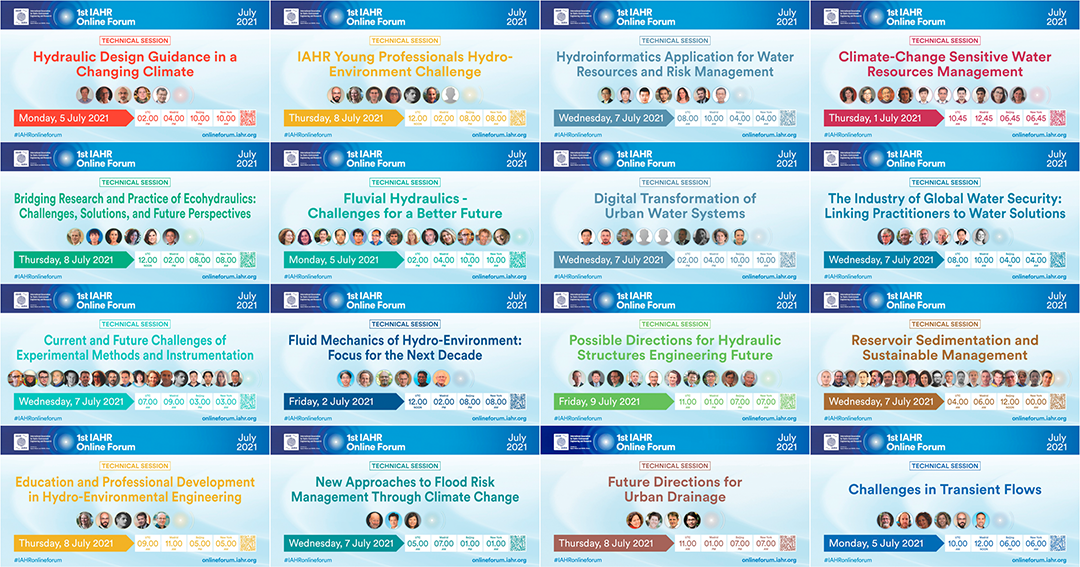The 1st IAHR Online Forum is not over! More than 40 hours of knowledge and discussions on water security freely available online
In this time of limited travel, the first-ever IAHR Online Forum was a wonderful opportunity to bring together the entire IAHR community along with many global stakeholders and experts from around the world to share our thoughts and proposals for grappling with some of the deeper issues and challenges facing water resources management for sustainable development, as well as to discuss emerging trends and directions for water security.
With contributions from more than 200 experts, the Forum attracted over 9,000 participants from all over the world and included 8 key plenaries and 19 technical sessions which will be sure to help shape our common hydro-environment future together. But the Forum is not over: all the sessions are and will continue to be freely accessible online. You can access more than 40 hours of knowledge and discussions on a full range of topics essential to water security!
Key plenaries

With keynote speakers from the most relevant organisations and programmes, including among others UNESCO, the Spanish Ministry for Ecological Transition and Demographic Challenges, Deltares, IHE-Delft, the UN Decade of Ocean Science for Sustainable Development, the International Union for Conservation of Nature (IUCN), K-Water, Suez Spain, Electricité de France (EDF), the United Nations University Institute for Water, Environment and Health (UNU-INWEH), Arup, Scottish Water, the Chinese Ministry of Water Resources, the World Bank, the European Environment Agency, the Asia Water Council, etc., the key plenaries gave an impressive overview of the challenges the water security community is confronted with today, and brought the following vital issues to the forefront:
The need to break out of the confines of our individual disciplines and apply a holistic approach (Hydro-Environment from Source to Sea), including Nature-based Solutions (Ecohydraulics and Nature-Based Solutions for Water Security), to ensure water security in a changing and complex environment (Opening Session);
The necessity to better integrate scientific knowledge, data, and science with water governance to address global issues and make evidence-based decisions;
The impact of the COVID-19 pandemic on water issues (Water and COVID-19: Impacts and Solutions);
The importance of diversity, equity, and inclusion in the field of water engineering, science, and research (A Diverse Approach to Hydraulic and Environmental Research. Vision and Mission of Women Scientists);
The key role of education, capacity-building and professional development, especially in Africa (Water Challenges and Professional Development in Africa);
The need to make science actionable for decision-making; how greener approaches can strengthen resilience and capacity and the role hydro-environment engineering, practice, and research play in this regard (The Future of Water Infrastructure: Construction, Operation, Maintenance in a Greener Environment) ; and finally,
The importance of Open Science and the need to popularize Open Access (How to multiply by 6 the impact of your research. Open Access and IAHR Journals).
Technical sessions
The whole community of IAHR technical committees and working groups played a key role in contributing to highlight, analyse, and better understand the key challenges and trends in their respective areas, including
New Approaches to Flood Risk Management through Climate Change
Current and future challenges of Experimental Methods and Instrumentation
Hydroinformatics Application for Water Resources and Risk Management
The Industry of Global Water Security: Linking Practitioners to Water Solutions
Education and Professional Development in Hydro-Environmental Engineering
Possible Directions for Hydraulic Structures Engineering Future
and much more!
Did you miss a session? You can rewatch all live sessions on the Forum website.
Special thanks
We’d especially like to thank K-Water for their sponsorship which helped to make this first IAHR Online Forum a success.